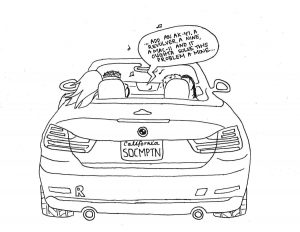In the past three weeks, I’ve received a remarkable number of offers to see the new hit movie “Straight Outta Compton,” which documents the history of N.W.A., arguably the most famous “gangsta rap” group of all time. As a white male living in an affluent community, the offers made me very curious as to my friends’ motives behind their desire to see the movie.
Since the movie’s release on Aug. 14, it has been the highest-selling film in theaters, according to Rotten Tomatoes, generating more revenue than the next two movies on the list combined. Here in this community, it seems our only taste of this supposed “ghetto culture” comes from the media, music, movies and television.
Without the media’s depiction of what a ghetto is, I would define a ghetto as a place where people resort to violence and selling drugs as a result of several factors, including a lack of hope, inspiration, family stability, education, and fortune, as well as the necessity to live.
However, these days it seems that the media’s documentation of activity in poor neighborhoods glorifies the extremes of violence and gang activity as well as sexism and objectification of women. Sexism and violence are virtually unseen in our Redwood bubble compared to the entertainment industry’s depiction of “ghetto” communities.
According to the 2012 American Community Survey by the U.S. Census Bureau, Marin County ranks a close second in California in median household income, and seventeenth in the country. The wealth, quiet suburban lifestyle, and lack of both ethnic and socioeconomic diversity that surrounds us has generated a lingering curiosity about marginalized communities among many of the county’s youth. But we should redirect our curiosity from the stereotyping of poorer communities to actually understanding the problem and helping create change.
The “ghetto,” or at least many teenagers’ perception of it, represents an edgy, risky and exciting lifestyle far from anything most people in our community have come close to experiencing. Walking through the Redwood parking lot, it is not uncommon to hear derogatory lyrics blasting from luxury cars. I hear students passively listening to lyrics about gun violence, strip clubs, and other problems virtually nonexistent in our community. Some of these students know it’s wrong, and yet they do it anyway.
Teenage rebellion is not new. We rebelled in the 1950s, when rock and roll music took over our minds. We rebelled in the ‘70s, when the sexual liberation movement took over our souls. Today, however, we don’t need to listen to music with demeaning lyrics in order to rebel.
The “ghetto” is viewed as taboo for many adolescents in our community. As a result, Marin’s youth views the forbidden fruit, the vicarious thrill of a contrasting lifestyle, in a positive, scandalous way.
It seems many of my peers have become so fascinated with the differing way of life in disadvantaged communities that they are almost astonished it’s someone else’s reality. They listen to music that describes a harsh life, yet look past the struggle and meaning behind it, and continue to use derogatory language such as the “N” word without understanding the historical context that accompanies it.
Poverty and adversity are so close, yet so far from our Redwood community. A mere 10-minute drive away lies Marin City, whose median household income remains almost $30,000 below Marin County’s average, according to the U.S. Census Bureau. One could even drive as far as 20 minutes to Richmond, whose median household income is almost $50,000 below that of Marin County. Though Redwood remains a short distance from these places, I continue to hear people throw around stereotypes and persist in associating these cities with danger, drugs and violence, never having been to the areas themselves to be any the wiser.
According to a Redwood student who lived in Oakland, a place I’ve heard many refer to stereotypically as “ghetto,” he claimed to have received many cliché questions upon his move to Marin, like, “Did you hear shootings?” and “Did you deal [drugs]?”
Out of fear, ignorance and misunderstanding, it seems that we continue to ignore local issues. Many of us travel to foreign countries to complete service in impoverished areas, spending thousands of dollars while completely bypassing the issues that lie minutes away.
While I’m not saying these places don’t deserve assistance, we need to focus our attention on the issues that remain in close proximity to our school and immediate community.
The inner-city lifestyle depicted by the entertainment industry unduly exalts the most pressing issues of the impoverished, leading those of us in wealthier communities to a skewed understanding. When we don’t have this understanding, we don’t think we need to help, inadvertently slowing potential growth in lower-class communities. How can those living in “the ghetto” rise out of their situation when those with more privilege overlook their issues?
In a our well-educated community, where we are surrounded by success and high aspirations, it is our responsibility to embrace our privileges, take initiative and enhance our understanding of socioeconomic issues in order to progress.







